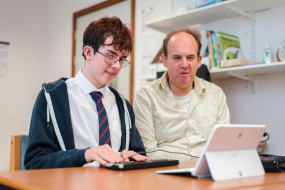Please note that as of October 2020, we now operate as Sight Scotland. Our former name, Royal Blind will appear in content, such as reports, produced before that date.
New figures published today by the Scottish Government show the numbers of pupils with vision impairment in Scotland’s schools has more than doubled over the last ten years, leading to a call from Scotland’s largest vision impairment charity for increased specialist support. Royal Blind is calling on local authorities and the Scottish Government to take urgent action to improve support for blind and partially sighted pupils.

Over the same period where there has been an increase in the number of pupils with vision impairment there has been a reduction in the number of specialist teachers for children and young people with vision impairment. The Royal Blind School and Learning Hub are part of Royal Blind, and the charity is concerned that specialist teachers in vision impairment in mainstream schools are facing unreasonable pressures, being asked to support more pupils with less time to do so.
Royal Blind is calling on local authorities and the Scottish Government to ensure the right support is in place for vision impaired pupils and their families in the future.
Responding to the figures, Mark O’Donnell, Chief Executive of Royal Blind said:
“Up to 80% of our learning is through our use of vision, so it is vitally important that specialist support is provided for pupils with vision impairment who have a huge learning disadvantage in comparison to their fully sighted peers. Our concern is that over the same period there has been an increase in the numbers of pupils with vision impairment there has actually been a reduction in the support available to them in mainstream schools. Recently we have actually seen local additional support needs budgets being cut.
“More research is required into why there has been this increase in the number of children and young people with vision impairment, but the trend is clear meaning there are more pupils who need extra support. Our highly specialist teachers in vision impairment do a great job, with no additional incentives provided for them to undertake their training. But there are fewer of them, being asked to do more and more.
“This situation is leading to an attainment gap for pupils with vision impairment.3 That is why we have launched Our Vision for Equal Education campaign, calling for better support in mainstream schools for vision impaired pupils and a fairer process for securing a place at a special school for pupils who would benefit from it.”